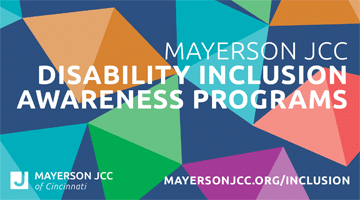 Inclusion is central to what we do here at the J. In the broadest sense, we engage people regardless of religious affiliation, background, age, ethnicity, or other factors that all too often form boundaries. We’re also proud to be home to the Milton and Frances Schloss Special Needs & Services department, which provides programming for people of all ages with disabilities. Two years ago, we launched an annual Disability Inclusion Awareness Month to serve as an extension of this programming, to educate and raise awareness of inclusion issues for people throughout the community.
Inclusion is central to what we do here at the J. In the broadest sense, we engage people regardless of religious affiliation, background, age, ethnicity, or other factors that all too often form boundaries. We’re also proud to be home to the Milton and Frances Schloss Special Needs & Services department, which provides programming for people of all ages with disabilities. Two years ago, we launched an annual Disability Inclusion Awareness Month to serve as an extension of this programming, to educate and raise awareness of inclusion issues for people throughout the community.
This year, we’re thrilled to expand our Disability Inclusion Awareness series into nearly a full year of programming. From February – November, we’ll feature enlightening speakers, engaging community activities, and entertaining programs, all designed to educate and illuminate issues that are relevant to fostering a spirit of inclusion throughout our community every day.
Want tips on planning your own inclusive programming? Check out these recommendations from the Union for Reform Judaism:
- Embrace the disabilities advocacy principle of “Nothing about us without us” in all your inclusion efforts.
Invite people with disabilities to be involved and to participate as leaders in every conversation, program, and plan related to disabilities inclusion. Just as we shouldn’t and couldn’t develop efforts to combat racism without the guidance and leadership of people of color, we will be most successful and respectful when we acknowledge the expertise of people with disabilities in combating ableism and in developing strategies that actually address the true needs and wishes of people with disabilities.
- Ask those with disabilities the way they want to be addressed and identified.
Learn about “identity and disability pride” and “people-first” language and explain why you use either or both, including spoken, printed, and online resources. Some in the disabilities community prefer people-first language, which reflects that a disability does not define a person – i.e. “a child with autism,” not “an autistic child,” or “a person who stutters” rather than “a stutterer.”
Note, however, that positive identities are often said first, i.e. “a Jewish person,” “a kind person,” and so many people in the disabilities community prefer to identify proudly as “a deaf person” or “an autistic person,” for example to indicate that their disability is a difference but not a negative.
The most important part of being inclusive is getting to know the needs and preferences of individuals with disabilities – and so, on an individual level, it’s best to simply inquire about how people with disabilities wish to be identified.
- Ensure that all members, including people with disabilities, can contribute to congregational/[community] life in meaningful ways.
Everyone has something to contribute and every person wants to be a valued and needed member of the community. Invite people, including those with disabilities, to participate in various opportunities. Consider people with disabilities for employment, and make it possible for people with disabilities to participate in leadership opportunities.
